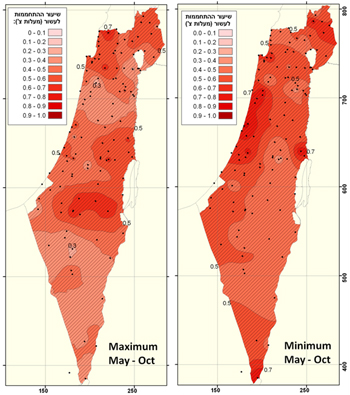| Previous issues | Subscribe |
| STUDENTS & GRADUATES |
|---|
|
|
|
|
|
|
|
|
| TECHNOLOGY |
|---|
|
|
|
|
| INITIATIVES - LANGUAGE |
|---|
| INTERNATIONAL |
|---|
| HIGHLIGHTS |
|---|
|
|
|
|
|
|
|
|
|
|
|
|
|
|
|
Co-editors: Elissa Allerhand, Ilene Bloch-Levy Photographer: Gideon Markowitz Graphic Designer: Laura Grinberg Web Manager: Batsheva Engelberg-Behr Web Master: Sonia Pechersky |
| RESEARCH |
|---|
Getting Hotter All the Time
As summer approaches, Israelis complain about it "being hotter and hotter." Are they exaggerating? Not at all, according to Dr. Baruch Ziv, of the Open University's Department of Natural Sciences. Indeed, according to the latest maps that Dr. Ziv with colleagues Prof. Hadas Sa'aronit from Tel Aviv University and students, Roi Pergament and Pinhas Alpert from Tel Aviv University, and Avner Forshpan and Isabella Tushinsky from the Meteorological Services have plotted, Israel has been heating up twice as fast as the rest of the world. The big change in winter weather began to happen in the 1990's, where until then winters were colder and summers were hotter, but since the latter part of the 20th century, the winters began to get hotter as did the summers. In the past thirty-five years, our hottest season has heated up by some 2 degrees centigrade. Yes, as the world heats up, so is Israel, but this has been exacerbated in the urban regions by increased use of air conditioners, cars and washing machines all of which inject a great amount of heat in the atmosphere. Will this rate continue? Dr. Ziv says, "I'm certain that urban warming will get worse, but I'm not sure that the general rate of the increasing summer heat will maintain the current level." Steady RainfallAs summer is upon us, the Sea of Galilee - the Kinneret's red line is being carefully watched as the last of the rains make their way down from the Golan Heights and Galilee mountains into the Kinneret. Most Israelis are convinced that our rainfall is diminishing. But, according to Dr. Ziv, "the climate forecast for the next century indicates severe drying over the Mediterranean as a whole, but so far, while the rainfall shows a decreasing trend, the signal is still too early to show any statistically significant change."What has happened is that the rainy season has realigned itself. "Over the past 35 years, Israel's rainy season has been shortened by about 12 days, but the average of 500 millimeters of rainfall per rainy season remains almost steady. Spacing between rainfalls is increasing." "March and April have been experiencing less rainfall, but during the winter months, we have seen a little more rain."
Page: 1 2
|
